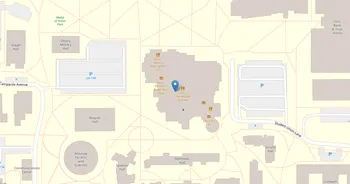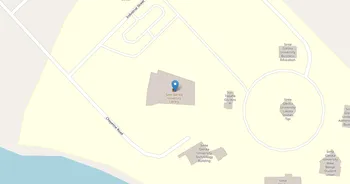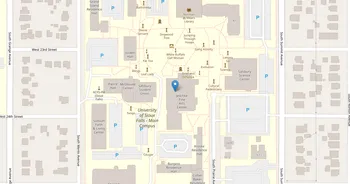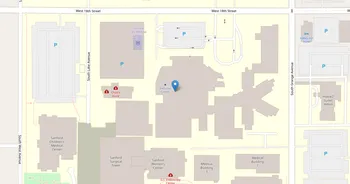South Dakota School of Mines and Technology : Overview, Courses, Scholarships & Rankings
About South Dakota School of Mines and Technology
Look up from campus and you'll spot M Hill, a long-running student tradition that hints at the school's grit. South Dakota Mines is known for strength in engineering, earth science, computing, and materials. Students log time in labs, maker spaces, and field sites, and a campus museum adds real specimens to the mix. Support stays practical with tutoring, advising, career coaching, and chances to jump into research.
Life here is active and unpretentious. Project teams, clubs, and athletics sit alongside weekends in the Black Hills hiking or climbing. The culture favors teamwork and get-it-done problem solving, and it's friendly. Employers in energy and tech recruit on campus, so internships and co-ops are common. Rapid City brings trails, galleries, and community service close to class.
Key Institutional Details
Contact & Profile
Academic & Institutional
Academic Programs & Fields of Study
South Dakota School of Mines and Technology offers 30 degree programs across 9 major academic fields, graduating approximately 496 students annually. The most popular fields by graduate volume are Engineering (13 programs, 365 graduates), Computer & IT (2 programs, 42 graduates), Physical Sciences (5 programs, 33 graduates), Eng. Technologies (2 programs, 15 graduates) and Interdisciplinary (2 programs, 13 graduates). Explore program details, award levels, and graduate demographics below.
Engineering (13 programs, 365 graduates)
Engineering Sciences and Applied Technology Solutions
| Program Name | Graduates | Gender Distribution | Award Levels | CIP Code |
|---|---|---|---|---|
| Mechanical Engineering | 93 |
|
Bachelor's
Master's
|
14.1901 |
| Civil Engineering | 48 |
|
Bachelor's
Master's
Doctorate (R)
|
14.0801 |
| Industrial Engineering | 42 |
|
Bachelor's
Postbac Cert.
Master's
|
14.3501 |
| Chemical Engineering | 36 |
|
Bachelor's
Master's
Doctorate (R)
|
14.0701 |
| Electrical and Electronics Engineering | 32 |
|
Bachelor's
Master's
|
14.1001 |
| Metallurgical Engineering | 29 |
|
Bachelor's
|
14.2001 |
| Mining and Mineral Engineering | 23 |
|
Bachelor's
Master's
|
14.2101 |
| Biomedical Engineering | 22 |
|
Bachelor's
Master's
|
14.0501 |
| Geological and Geophysical Engineering | 16 |
|
Bachelor's
Master's
Doctorate (R)
|
14.3901 |
| Computer Engineering | 10 |
|
Bachelor's
|
14.0901 |
| Construction Engineering | 9 |
|
Master's
Post-Master's
|
14.3301 |
| Materials Engineering | 4 |
|
Master's
|
14.1801 |
| General Engineering | 1 |
|
Master's
|
14.0101 |
Computer & IT (2 programs, 42 graduates)
Computer Science, Information Technology and Cybersecurity
| Program Name | Graduates | Gender Distribution | Award Levels | CIP Code |
|---|---|---|---|---|
| Computer and Information Sciences | 35 |
|
Bachelor's
|
11.0101 |
| Artificial Intelligence | 7 |
|
Master's
|
11.0102 |
Physical Sciences (5 programs, 33 graduates)
Chemistry, Physics and Earth Sciences Research
| Program Name | Graduates | Gender Distribution | Award Levels | CIP Code |
|---|---|---|---|---|
| Geology and Earth Science | 10 |
|
Bachelor's
|
40.0601 |
| Atmospheric Sciences and Meteorology | 8 |
|
Bachelor's
Master's
Doctorate (R)
|
40.0401 |
| Physics | 8 |
|
Bachelor's
Master's
|
40.0801 |
| Chemistry | 4 |
|
Bachelor's
Master's
|
40.0501 |
| Paleontology | 3 |
|
Master's
|
40.0604 |
Eng. Technologies (2 programs, 15 graduates)
Applied Engineering Technologies and Technical Support
| Program Name | Graduates | Gender Distribution | Award Levels | CIP Code |
|---|---|---|---|---|
| Industrial Engineering Management | 12 |
|
Master's
|
15.1501 |
| Nanotechnology | 3 |
|
Master's
Doctorate (R)
|
15.1601 |
Interdisciplinary (2 programs, 13 graduates)
Cross-Disciplinary Studies and Integrated Research Programs
| Program Name | Graduates | Gender Distribution | Award Levels | CIP Code |
|---|---|---|---|---|
| Multi- and Interdisciplinary Studies | 12 |
|
Bachelor's
|
30.9999 |
| Data Science | 1 |
|
Doctorate (R)
|
30.7001 |
Biological Sciences (2 programs, 12 graduates)
Life Sciences, Biotechnology and Biomedical Research
| Program Name | Graduates | Gender Distribution | Award Levels | CIP Code |
|---|---|---|---|---|
| Biology and Biological Sciences | 11 |
|
Bachelor's
|
26.0101 |
| Biotechnology | 1 |
|
Bachelor's
|
26.1201 |
Health (1 programs, 7 graduates)
Healthcare Professions, Medical Sciences and Clinical Practice
| Program Name | Graduates | Gender Distribution | Award Levels | CIP Code |
|---|---|---|---|---|
| Occupational Health and Industrial Hygiene | 7 |
|
Post-Master's
|
51.2206 |
Mathematics (2 programs, 6 graduates)
Mathematical Sciences, Statistics and Computational Analysis
| Program Name | Graduates | Gender Distribution | Award Levels | CIP Code |
|---|---|---|---|---|
| Mathematics | 5 |
|
Bachelor's
|
27.0101 |
| Applied Mathematics | 1 |
|
Bachelor's
|
27.0304 |
Liberal Arts (1 programs, 3 graduates)
Liberal Arts Education, General Studies and Humanities
| Program Name | Graduates | Gender Distribution | Award Levels | CIP Code |
|---|---|---|---|---|
| General Studies | 3 |
|
Associate's
|
24.0102 |
Admission Requirements & Test Scores
Comprehensive overview of admission criteria, standardized test score ranges, and application requirements for prospective students at South Dakota School of Mines and Technology.
Application Requirements
Data based on IPEDS for 2022-2023 academic year. Test score ranges represent the middle 50% of admitted students (25th-75th percentile). Requirements may vary by program.
Tuition, Fees & Estimated Costs
Overview of tuition rates, housing, and other annual education expenses for undergraduate and graduate students
Financial Aid & Student Support
Summary of scholarships, grants, student loans, and financial aid statistics for undergraduate students
Student Success Metrics
Graduation rates and post-graduation earnings to help assess student outcomes and long-term value of education.
Loan Burden & Repayment Outcomes
Breakdown of loan repayment rates and student debt levels by income and dependency status.
Frequently Asked Questions
Find answers to the most common questions about South Dakota School of Mines and Technology
How much does it cost to attend South Dakota School of Mines and Technology?
The annual tuition at South Dakota School of Mines and Technology is $10,400 for in-state students and $14,800 for out-of-state students. When including room and board, books, and other expenses, the total estimated cost is approximately $26,100 for in-state students and $30,500 for out-of-state students. Additional costs include room and board $8,800 (on) / $11,700 (off) and books and supplies $1,900.
Data based on IPEDS program completions for 2022-2023 academic year. Tuition and cost estimates are approximate and may not include all fees, personal expenses, or transportation costs.
What academic programs and degree levels does South Dakota School of Mines and Technology offer?
South Dakota School of Mines and Technology offers 30 academic programs across 9 major fields of study, with available degree levels: Associate's, Bachelor's, Postbac Cert., Master's, Post-Master's, Doctorate (Research).
Most popular program areas include:
- Engineering Sciences and Applied Technology Solutions (13 programs)
- Computer Science, Information Technology and Cybersecurity (2 programs)
- Chemistry, Physics and Earth Sciences Research (5 programs)
- Applied Engineering Technologies and Technical Support (2 programs)
- Cross-Disciplinary Studies and Integrated Research Programs (2 programs)
Data based on IPEDS program completions for 2023-2024 academic year. Numbers reflect programs where students graduated, not all offered programs.
What is the acceptance rate for South Dakota School of Mines and Technology?
South Dakota School of Mines and Technology has an 85.3% acceptance rate and a 37.8% yield rate, making it moderately selective.
Admission statistics breakdown:
- Total applicants: 1,539
- Students admitted: 1,312
- Students enrolled: 496
Data based on IPEDS for 2022-2023 academic year. Admission statistics may vary by program and application cycle.
What financial aid and scholarships are available at South Dakota School of Mines and Technology?
South Dakota School of Mines and Technology provides financial aid to 24% of first-time, full-time students, with average grants of $4,746 and average loans of $7,924.
Average financial aid amounts by type:
- Pell grants: $4,828
- State/Local grants: $1,285
- Institutional grants: $3,565
- Federal loans: $5,028
The university supports 434 students with grants and 283 students with loans annually.
Data based on IPEDS for 2022-2023 academic year. Financial aid amounts and percentages may vary by program, enrollment status, and individual circumstances.
What is the average salary for South Dakota School of Mines and Technology graduates?
South Dakota School of Mines and Technology graduates earn a median salary of $62,863 after 6 years and $72,257 after 10 years.
The salary range 10 years after graduation spans from $46,211 (25th percentile) to $101,142 (75th percentile), with top earners reaching $103,200 (90th percentile).
Data based on IPEDS for 2022-2023 academic year. Salary data reflects graduates who received federal financial aid (approximately 60% of all graduates). Actual earnings may vary significantly based on program, location, and individual circumstances.
Related Universities




Found something useful? Help others discover it too! Share with friends, on social media, or save for later - every share helps someone find the information they need.